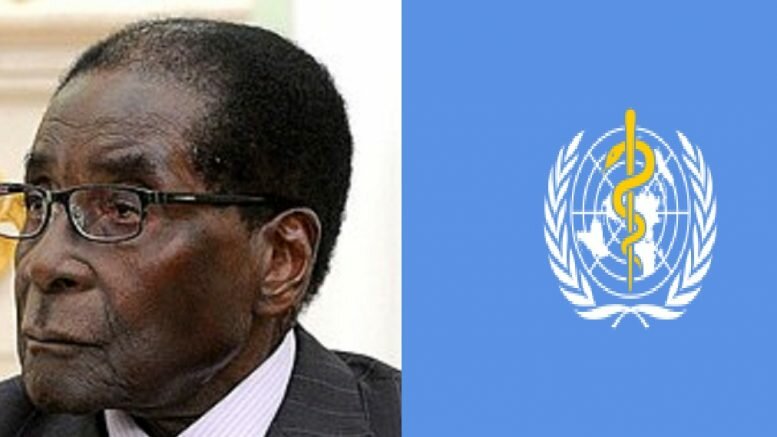WHO withdraws the appointment of Robert Mugabe as a goodwill Ambassador
The head of the World Health Organization (WHO) withdraws the appointment of Zimbabwean President Robert Mugabe as a goodwill Ambassador after massive criticism of the appointment.
It raised quite a few eyebrows when President of Zimbabwe, Robert Mugabe, was appointed an Ambassador by the WHO.
On Sunday, the WHO decided to cancel the appointment. A statement from WHO Director General, Tedros Ghebreyesus, who himself comes from Ethiopia, confirms this.
93-year-old Mugabe has ruled Zimbabwe over the last 30 years and is accused of being both dictatorial and to grossly violating human rights.
– I’m listening. I hear their concerns. Reverses the decision in light of WHO values. I will make an official statement as soon as possible, he tweeted on Saturday.
April fool’s day
Tone Skogen (Conservatives), State Secretary serving under Minister of Foreign Affairs, Ine Eriksen Søreide, is one of those who reacted.
– Norway is critical of the suitability of President Robert Mugabe as goodwill ambassador for the WHO. This does not help strengthen the organization’s reputation, Skogen told Dagbladet on Friday.
Neither Britain, the United States, Ireland nor Canada is particularly impressed with the award.
A statement from the US Department of Foreign Affairs states that the decision is in disaccord with UN ideals, and Britain says that it is “surprising and disappointing.”
– The appointment is unacceptable. I think it is a very bad April fool’s day joke, according to Prime Minister of Canada, Justin Trudeau.
Criticism from organizations
Organizations like Human Rights Watch, UN Watch, the World Heart Federation, Action Against Smoking and British Cancer Research are also among those who respond strongly. The three latter have signed a joint protest letter after the appointment, referring to the major human rights violations in Zimbabwe.
– The tyrant in Zimbabwe is the last person to be legitimized by the UN in any way, states the head of UN Watch, Hillel Neuer.
Earlier this week, Ghebreyesus hailed Mugabe’s health policy and claimed that the 93-year-old would be able to “exert influence on his peers in the region.”
– A man who flies to Singapore for medical treatment after destroying Zimbabwe’s health sector is WHO’s goodwill ambassador, tweets Doug Coltart, human rights activist and attorney in Zimbabwe.
Facts about Robert Mugabe (Wikipedia)
Robert Gabriel Mugabe (/muːˈɡɑːbiː/; Shona pronunciation: [muɡaɓe]; born 21 February 1924) is a Zimbabwean revolutionary and politician who has been President of Zimbabwe since 1987; he previously led Zimbabwe as Prime Minister from 1980 to 1987. He chaired the Zimbabwe African National Union (ZANU) group from 1975 to 1980 and has led its successor political party, the ZANU – Patriotic Front (ZANU–PF), since 1980. Ideologically an African nationalist, during the 1970s and 1980s he identified as a Marxist-Leninist although after the 1990s self-identified only as a socialist; his policies have been described as Mugabeism.
Mugabe was born to a poor Shona family in Kutama, Southern Rhodesia. Following an education at Kutama College and the University of Fort Hare, he worked as a school teacher in Southern Rhodesia, Northern Rhodesia, and Ghana. Angered that Southern Rhodesia was a British colony governed by white colonists, Mugabe embraced Marxism and joined African nationalist protests calling for an independent black-led state. After making anti-government comments he was convicted of sedition and imprisoned between 1964 and 1974. On release he fled to Mozambique, established his leadership of ZANU, and oversaw ZANU’s role in the Rhodesian Bush War, fighting Ian Smith’s predominantly white government. He reluctantly took part in the peace negotiations brokered by the United Kingdom that resulted in the Lancaster House Agreement. The agreement dismantled white minority rule and resulted in the 1980 general election, at which Mugabe led ZANU-PF to victory and became Prime Minister of the newly renamed Zimbabwe. Mugabe’s administration expanded healthcare and education, and—despite his Marxist rhetoric and professed desire for a socialist society—adhered largely to conservative economic policies.
Mugabe’s initial calls for racial reconciliation failed to stem deteriorating race relations and growing white flight. Relations with Joshua Nkomo’s Zimbabwe African People’s Union (ZAPU) also declined, with Mugabe crushing ZAPU-linked opposition in Matabeleland during the Gukurahundi between 1982 and 1985; at least 10,000 people, mostly Ndebele civilians, were killed by Mugabe’s Fifth Brigade. Pursuing decolonization, Mugabe’s government emphasised the redistribution of land controlled by white farmers to landless blacks, initially on a “willing seller-willing buyer” basis. Frustrated at the slow rate of redistribution, from 2000 Mugabe encouraged the violent seizure of white-owned land. Food production was severely impacted, generating famine, international sanctions, and drastic economic decline. Opposition to Mugabe grew, particularly through the Movement for Democratic Change, although he was re-elected in 2002, 2008, and 2013 through campaigns dominated by violence, electoral fraud, and nationalistic appeals to his rural Shona voter base. Internationally, Mugabe sent troops to fight in the Second Congo War and chaired the Non-Aligned Movement (1986–89), the Organisation of African Unity (1997–98), and the African Union (2015–16).
Having dominated Zimbabwe’s politics for nearly four decades, Mugabe has been a controversial and divisive figure. He has been praised as a revolutionary hero of the African liberation struggle who helped to free Zimbabwe from British colonialism, imperialism, and white minority rule. Conversely, he has been derided as a dictator responsible for economic mismanagement, widespread corruption, anti-white racial discrimination, human rights abuses, suppression of political critics and crimes against humanity.
© NTB Scanpix / Norway Today




